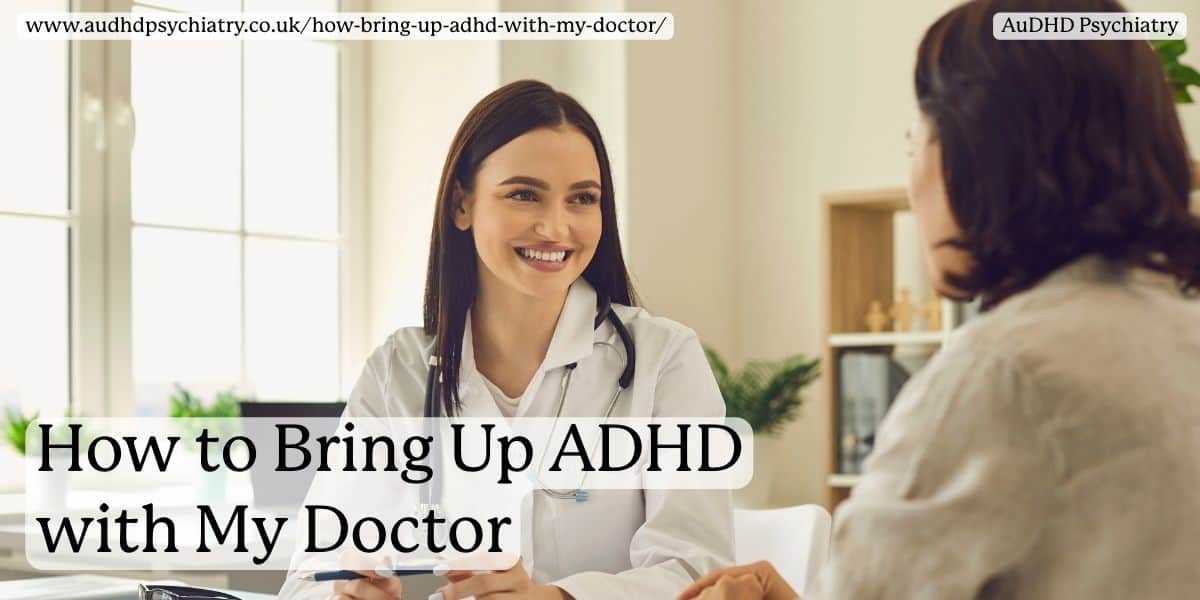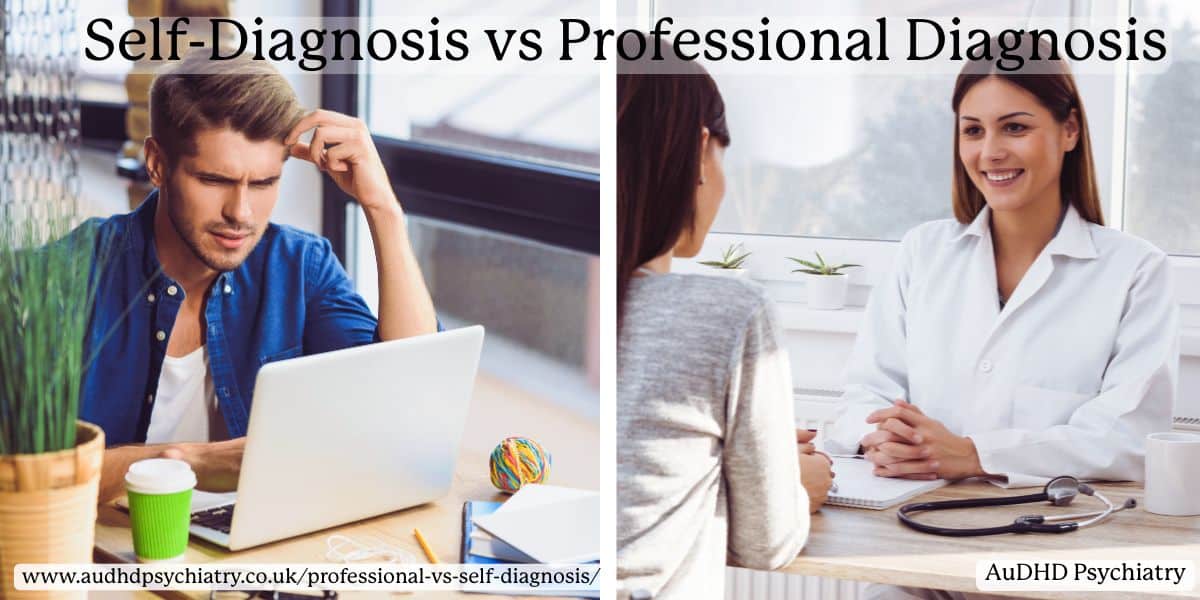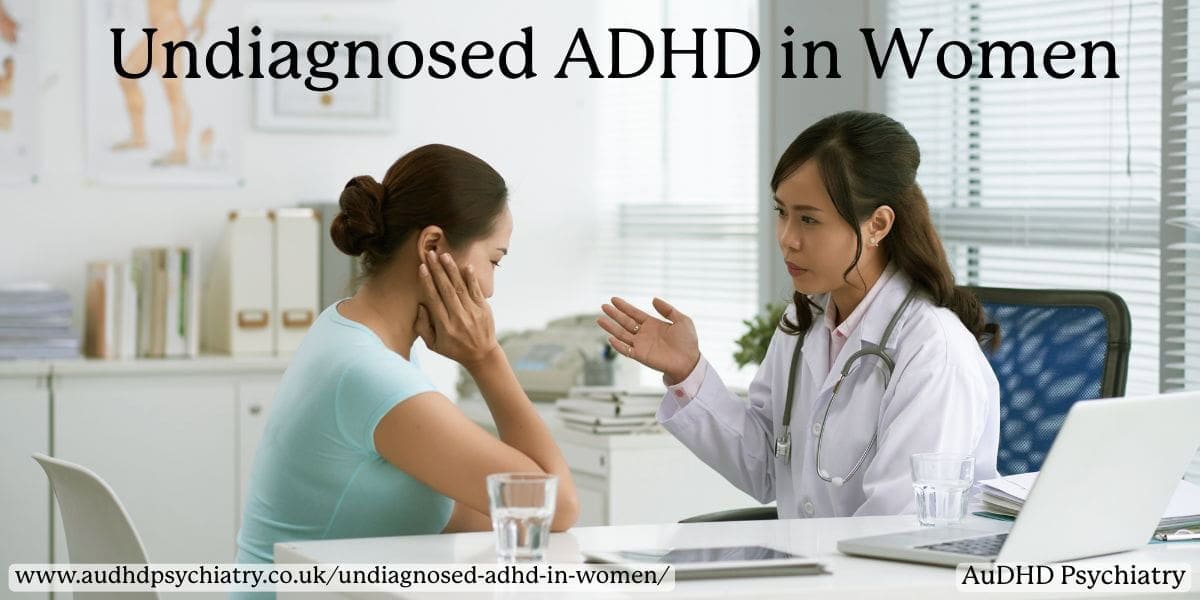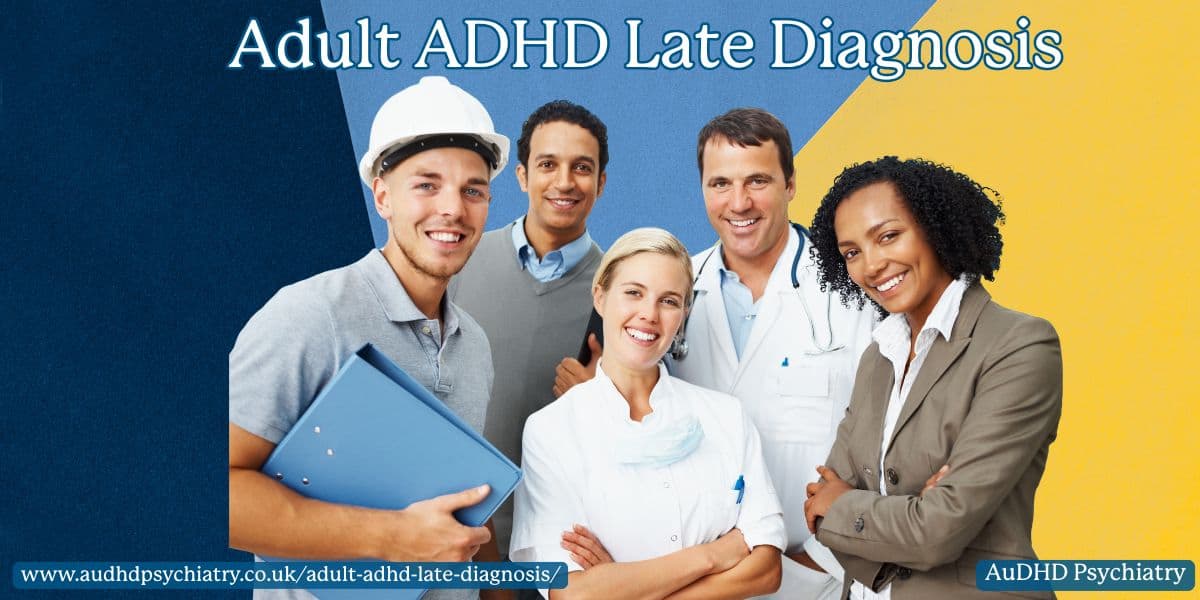
Living with undiagnosed ADHD into adulthood can be overwhelming. Many people only recognise the symptoms of ADHD later in life: struggling with focus, organisation, or emotional regulation, and wondering, “Is this ADHD, or just me?” The truth is that ADHD doesn’t disappear with age. For some, it’s first noticed at work, in relationships, or when daily responsibilities become harder to manage.
In the UK, rising awareness means more adults are seeking an ADHD assessment to understand long-standing challenges. Research shows that late diagnosis can explain years of frustration, while also opening the door to effective support, treatment, and new self-understanding.
This article explores ADHD in adulthood: why it’s often missed in childhood, how symptoms present differently in adults, the challenges of late diagnosis, and the treatment and coping strategies that help. By the end, you’ll see how recognising ADHD can be a turning point toward clarity and confidence.
Understanding ADHD in Adulthood
ADHD in adulthood is more common than many realise. Once thought of as a childhood-only condition, research shows that ADHD symptoms continue into adult life. These symptoms may look different compared with childhood ADHD, often showing up as poor organisation, forgetfulness, or difficulty managing time rather than obvious hyperactivity.
Why Late ADHD Diagnosis Happens
Many adults adapt by creating coping strategies: over-relying on planners, staying up late to catch up on tasks, or masking struggles in social settings. While these methods help temporarily, they can hide the true condition and delay an ADHD diagnosis.
Shifting Public Understanding
In the UK, there is now greater awareness of ADHD in adults. This has led to more people asking questions like “What is ADHD really, and could I have it?” Helpful resources, such as our guides on ADHD or just laziness? and ADD vs. ADHD, show that the reality is more complex than old stereotypes.
Strengths Alongside Struggles
ADHD is not only about challenges. Adults often display creativity, quick problem-solving, and hyperfocus—the ability to concentrate deeply on subjects of their interest. These strengths highlight why diagnosing ADHD is about more than identifying problems; it’s about recognising a full picture of strengths and difficulties.
How Common is Adult ADHD?
According to the NHS England, the National Institute for Health and Care Excellence (NICE) estimates indicate 3–4% of UK adults live with the condition, but many remain undiagnosed.
Gender Differences and Underdiagnosis
- ADHD in men is often spotted earlier due to visible hyperactivity symptoms.
- ADHD in women and girls is more likely to present with inattentive symptoms like poor concentration or disorganisation.
- As a result, adult women often only discover they have ADHD later in life, sometimes after exploring self-tests like our take our ADHD self-assessment or private assessment routes. For those exploring overlapping conditions, a private autism diagnosis for adults can also provide clarity and support.
Rising Numbers: More Cases or Better Awareness?
It’s not that more people suddenly have ADHD. It’s that healthcare providers and the public are more aware of adult ADHD symptoms. People are now more likely to seek an ADHD assessment after years of struggling with undiagnosed challenges.
Why Prevalence Matters
Understanding how widespread ADHD is helps reduce stigma. It shows that many people are not alone in experiencing forgetfulness, impulsive behaviour, or difficulties with executive function. For more on this, see our guide to the benefits of an ADHD diagnosis.
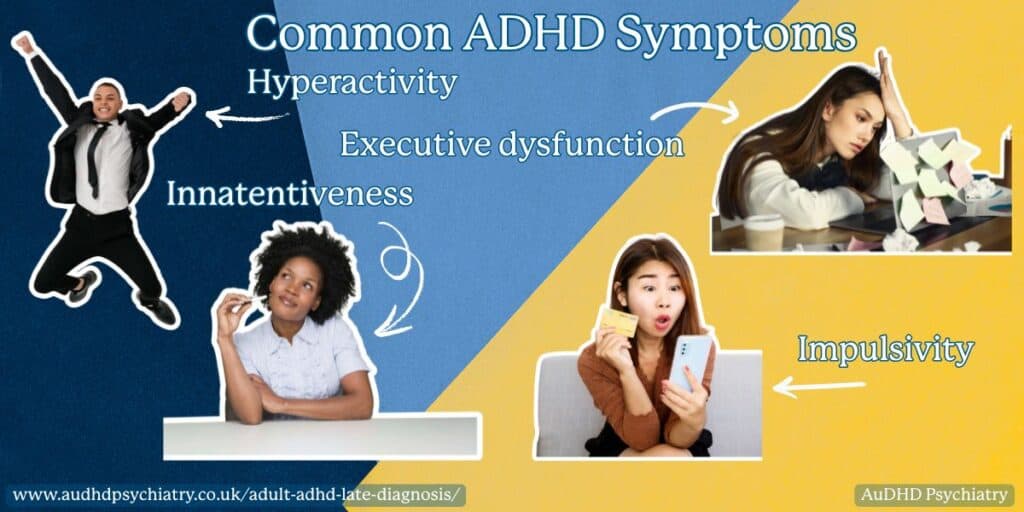
Symptoms of ADHD in Adults
Recognising symptoms of ADHD in adults is vital for seeking help. The presentation often differs from the classroom behaviours we associate with children.
Common Adult ADHD Symptoms
- Inattentive symptoms: poor concentration, disorganisation, losing items
- Hyperactive symptoms: restlessness, difficulty sitting still, constant activity
- Impulsive behaviour: interrupting, rushing decisions, difficulty waiting
- Executive function issues: poor time management, procrastination, forgetting deadlines
Emotional and Social Impact of Undiagnosed ADHD
Adults with ADHD may face mood swings, low self-esteem, or frustration after years of misunderstood difficulties. These emotional challenges can overlap with anxiety disorders or mood disorders, which sometimes delay an accurate diagnosis of ADHD. Understanding the steps involved in ADHD diagnosis can help reduce delays and guide adults toward proper support.
Strengths of ADHD
Despite difficulties, adults with ADHD often excel at creative problem-solving and innovative thinking. Many experience hyperfocus, where attention locks onto tasks they find stimulating. This ability can lead to exceptional productivity in areas of interest.
People with ADHD also tend to think outside the box, thrive in high-energy environments, and bring enthusiasm to group settings. Recognising these strengths is part of a new understanding of ADHD: one that focuses on potential as well as challenges.
Why an Accurate Diagnosis Matters
Because ADHD symptoms overlap with other mental health conditions, it is crucial to seek a qualified mental health professional or ADHD specialist for proper evaluation. Without an accurate professional ADHD assessment, individuals risk being misdiagnosed or receiving treatment that does not deal with the root cause. For example, untreated ADHD may be mistaken for depression, leading to partial improvement at best. Seeking professional neurodivergent assessments services ensures a comprehensive understanding of the condition, helping to pinpoint the true underlying causes of symptoms and guiding individuals toward appropriate treatment.
A thorough ADHD assessment considers developmental history, daily functioning, and co-occurring conditions. Getting the right diagnosis allows people to access tailored adult ADHD treatment options, from medication to coaching and workplace accommodations. Most importantly, it provides clarity, reframing years of struggle as symptoms of a recognised condition rather than personal failings. Our article on how ADHD affects the brain explains why understanding the condition is the first step to effective treatment.
The Challenges of Late Diagnosis
Living with undiagnosed ADHD into adulthood can bring unique obstacles. Many adults look back and wonder why their struggles were not recognised earlier, especially when they see how long the condition has impacted school performance, work, or relationships.
Why ADHD Goes Unnoticed
Historically, diagnostic criteria focused on children, particularly boys with hyperactive symptoms. Adults who were primarily inattentive, or who masked their difficulties, often slipped through the cracks. Teachers and healthcare providers sometimes attributed poor concentration or forgetfulness to laziness, stress, or personality rather than attention deficit disorder.
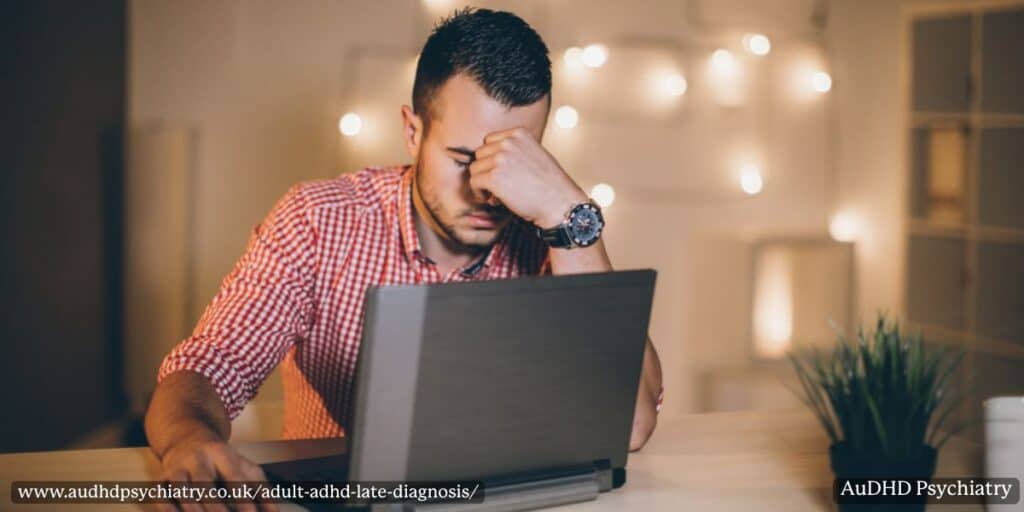
Masking and Coping Strategies
Adults with ADHD frequently create coping mechanisms to fit in. They may become perfectionists, overcompensate by working longer hours, or hide struggles behind humour or confidence. While these strategies help short term, they often lead to exhaustion, stress, and low self-esteem. ADHD masking also contributes to stigma, with many people believing they are simply “bad at life” instead of recognising a treatable condition.
Stigma and Misunderstanding
Stigma continues to play a major role in late diagnosis. Misconceptions that ADHD is only for children or that adults seeking help are “making excuses” prevent many from accessing support. Our article Is ADHD real or just an excuse? addresses these harmful myths.
Childhood History in Adult Assessments
When adults finally pursue an ADHD assessment, clinicians look at their developmental history. This might include:
- Old school reports
- Family interviews
- Personal accounts of difficulties in childhood
Even if someone developed coping strategies later in life, evidence of early challenges is a key part of the diagnostic process. Recognising this connection between early childhood and adulthood helps ensure an accurate diagnosis and avoids mislabelling ADHD as another mental health condition.
Taking an Adult ADHD Assessment
For adults in the UK, seeking an ADHD assessment can feel daunting, but knowing what to expect helps ease the process.
What Happens During an ADHD Assessment
An adult ADHD assessment with AuDHD Psychiatry begins when you book a consultation. You’ll meet with a Chartered Psychiatrist for a detailed interview covering current symptoms, personal history, and how ADHD affects everyday life. We explore executive dysfunction such as poor time management, organisation, and impulsive behaviour, nd we make it easy for patients to easily transfer your ADHD care from previous providers if needed.
Structured questionnaires and rating scales are often used, at times alongside input from family members or partners. This ensures a broad understanding of the person’s challenges and provides a comprehensive AuDHD diagnosis for tailored treatment planning.
NHS vs Private Pathways
Accessing an ADHD assessment through the NHS is possible but often involves long waiting times. Reports suggest adults may wait over a year to be seen. NHS England shares that in March 2025, up to 549,000 are possibly waiting for an ADHD Assessment. In contrast, private clinics can offer quicker access, sometimes within weeks.
Our guide on the NHS vs private ADHD assessment explains the benefits and drawbacks of both options. While private routes involve a cost, they may be the best choice for those seeking timely answers.
Screening Tools and Clinical Interviews
Self-assessment questionnaires can help identify potential signs of ADHD, but they are not enough for diagnosis. Clinical interviews carried out by a mental health professional or ADHD specialist remain the gold standard. These assessments evaluate symptoms in context, distinguishing ADHD from other conditions like anxiety disorders or depression.
The Importance of Professional Evaluation
Accurate diagnosis of ADHD ensures that treatment plans are tailored and effective. Without proper assessment, adults risk being misdiagnosed, delaying access to support such as
- ADHD treatment
- Therapy
- Workplace accommodations
- Stimulant or non-stimulant medication
Pursuing a structured assessment is therefore the first step toward meaningful change.
Managing ADHD in Daily Life
Daily life with ADHD in adulthood can be challenging, but there are strategies that help reduce stress and improve well-being. Managing ADHD is not only about medication but also about lifestyle, routines, and support systems.
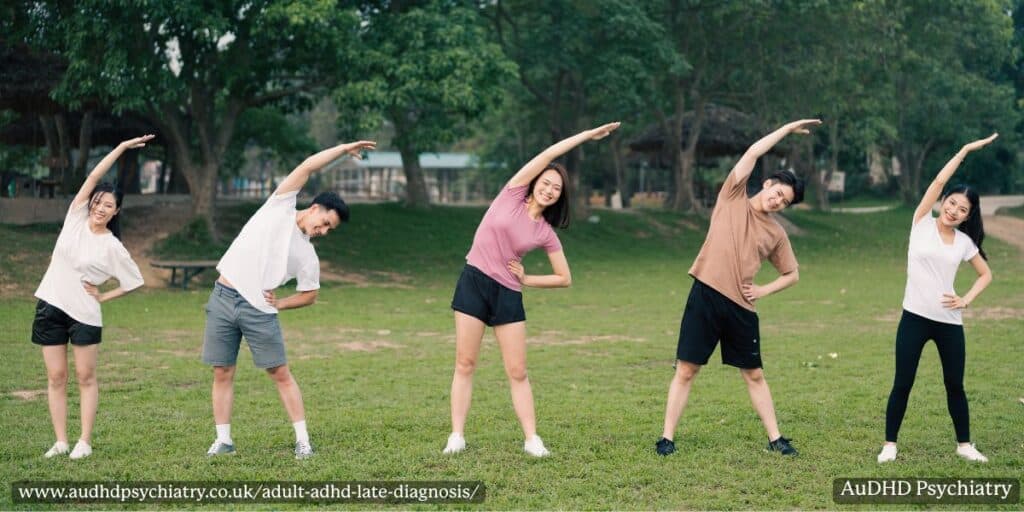
Lifestyle Strategies
Healthy routines are essential. Regular exercise helps reduce restlessness and improve focus. Balanced meals with steady energy release support attention and reduce mood swings. Sleep, often overlooked, is critical: adults with ADHD are more prone to disrupted sleep patterns, which worsen concentration and impulsivity. Setting a consistent sleep schedule and limiting late-night screen time can make a measurable difference.
Productivity and Executive Function
ADHD affects executive function, which makes it difficult to organise tasks or manage time. Using visual planners, reminders, or digital tools can improve productivity. Breaking large projects into smaller, manageable steps reduces overwhelm. Our article on ADHD-friendly planners explores tools that help structure daily tasks without adding pressure.
Work, College, and University
Adults with late diagnosis of ADHD may find professional or academic environments overwhelming. Struggles with deadlines, meetings, or exams are common. Open conversations with tutors or managers can help secure support. In the workplace, reasonable adjustments might include flexible deadlines, noise-cancelling headphones, or written instructions. Government support through Access to Work can provide practical assistance.
ADHD and Driving
Driving requires sustained attention and fast reactions. Adults with ADHD may be more prone to distractions or impulsive behavior on the road. Structured routines before driving, such as avoiding mobile phone use and minimising clutter, can help. For some, discussing safety and focus strategies with an ADHD specialist is part of responsible self-management.
ADHD and Relationship Difficulties
ADHD does not just affect the individual. It impacts families, partners, and friendships. Recognising these challenges is vital for building healthier connections.
Family Life and Parenting
Adults with ADHD who are parents may find the demands of childcare overwhelming. Forgetting appointments, struggling with organisation, or reacting impulsively can create stress within families. At the same time, parents with ADHD can bring creativity, energy, and playfulness to family life. Accessing ADHD support groups or parenting workshops helps develop routines that support both parents and children.
Romantic Relationships
In romantic partnerships, ADHD symptoms, such as inattentiveness or impulsivity, can be misunderstood as a lack of care. Missed anniversaries or forgotten tasks may create conflict. On the other hand, adults with ADHD often bring spontaneity, passion, and resilience to relationships.
Couples who acknowledge ADHD as a shared challenge rather than a personal flaw build stronger connections. Therapy or coaching can support communication and reduce tension.

Communication and Emotional Regulation
Many adults with ADHD experience difficulties with emotional regulation. This may show up as mood swings, frustration, or interrupting conversations. Open communication, active listening, and agreed strategies, such as pausing before responding, improve daily interactions. Our article on ADHD and emotional dysregulation provides further guidance.
Building Understanding
Relationships improve when family members and partners learn about ADHD. Reading reliable resources, joining support groups, or consulting professionals reduces blame and builds empathy. With understanding, relationships can shift from conflict to collaboration, where ADHD is managed as a shared challenge.
ADHD and Mental Health
ADHD rarely exists in isolation. Many adults also live with co-occurring mental health conditions, which complicates neurodivergent diagnosis and treatment.
Links with Anxiety, Depression, and Stress
Research shows higher rates of anxiety disorders and mood disorders like bipolar disorder among people with ADHD. Chronic stress from missed deadlines, strained relationships, or financial pressures often compounds symptoms. Low self-esteem, developed after years of misunderstood struggles, can also feed into depression. Addressing these overlapping issues is essential for effective care.
Risk of Burnout and Substance Use Disorders
Adults with ADHD often push themselves harder to compensate for executive function difficulties. This can lead to burnout, exhaustion, and long-term stress. In addition, some turn to alcohol or stimulants to cope, increasing the risk of substance misuse. Recognising these patterns early allows healthcare providers to offer targeted ADHD treatment that supports both focus and emotional wellbeing.
The Importance of Recognising Co-occurring Conditions
Accurate diagnosis of ADHD requires ruling out or addressing overlapping conditions. For example, poor concentration could stem from depression, ADHD, or both. Working with a mental health professional ensures that treatment plans account for the full picture. For many, the best approach includes stimulant or non-stimulant medications alongside cognitive behavioral therapy (CBT), which helps address both ADHD and emotional challenges.
Moving Toward Holistic Support
Understanding co-occurring conditions reframes ADHD as part of a broader health context. Instead of treating symptoms in isolation, a holistic plan supports daily functioning, emotional regulation, and long-term resilience. Resources such as our guide to managing ADHD medication side effects help adults make informed choices about care that supports both mental health and ADHD symptoms.
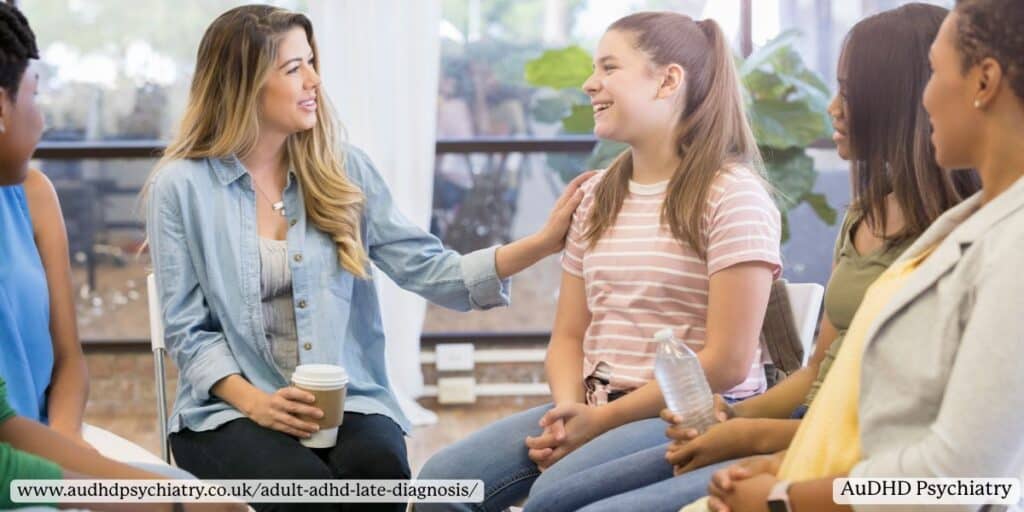
Support and Resources
Getting the right support for attention deficit hyperactivity disorder is about combining reliable information, practical tools, and a human connection. Adults with ADHD benefit from a mix of peer communities, education and employment services, and guidance from a qualified health professional or ADHD specialist.
Peer support groups and online communities
Peer spaces reduce isolation and provide tested strategies for everyday challenges like executive function and time management. Many adults find it helpful to join ADHD support groups and follow structured guides that explain symptoms in plain English. Start with our hub on ADHD resources and tools to discover moderated forums, coaching directories, and free tracking templates.
Education, training, and employment services
Study and work are common pain points for adults with ADHD. Many universities offer:
- Disability support
- Exam adjustments, and
- Coaching for time management skills
In employment, you may request reasonable adjustments such as written instructions, quiet workspaces, or meeting agendas in advance. You can check the UK’s Access to Work scheme as they can fund practical aids, travel support, and ADHD coaching.
Building awareness and advocacy
Public understanding is improving, yet ADHD stigma persists. Share evidence-based explainers and challenge myths. Advocacy includes educating colleagues, joining campaigns, and using respectful language that recognises ADHD as a neurodevelopmental disorder. Taking the first step to start your treatment can also inspire others to seek support and reduce stigma around adult ADHD.
How to support someone you know with ADHD
Supporting someone with ADHD in adulthood often begins with understanding rather than advice. Listening without judgment helps reduce stigma and shows the person that their experiences are valid. Social media has recently been spreading mixed advice on thriving with ADHD, so focusing on what your loved one truly needs is important.
Practical support can also make daily life easier. Examples include:
- Using shared calendars or digital reminders for appointments and deadlines
- Writing down key points after conversations to reduce misunderstandings
- Helping to create routines that support sleep, diet, and time management
Encouraging professional input is another important step. Many adults delay seeking an ADHD assessment because they are unsure if their struggles are “serious enough.” Family members or close friends can gently suggest:
- Speaking with a GP or ADHD specialist
- Exploring options for a private or NHS pathway
- Attending appointments together for added support
For some people, treatment may include ADHD medication alongside therapy or coaching. Families can support by:
- Learning about potential benefits and side effects
- Encouraging safe, clinician-led use
- Recognising that medication is only part of a wider ADHD treatment plan, which may include therapy, lifestyle strategies, and workplace adjustments
Finally, education and peer connection are powerful. Reading reliable resources about ADHD symptoms reduces blame and strengthens communication within families. Support groups—online or in person—offer practical strategies and reassurance that others face similar challenges.
When combined, empathy, structure, and accurate information provide the foundation for meaningful, long-term support.
ADHD Late Diagnosis: Conclusion
The story of ADHD in adulthood is changing. Where many once faced doubt or dismissal, there is now growing recognition that persistent ADHD symptoms affect everyday functioning in work, relationships, and study. Late diagnosis does not erase past challenges, yet it provides a framework to diagnose ADHD accurately and to pursue treatment options that address the real problem rather than the symptoms alone.
Receiving an ADHD diagnosis can be a powerful turning point. Adults often describe a shift from self-criticism to self-understanding. With the right support, people can harness strengths such as creativity, rapid problem solving, and hyperfocus. Practical routines, therapy, and, where appropriate, stimulant medications or non-stimulant medications, help translate insight into daily progress.
If you recognise symptoms of ADHD in adults in your own life, consider a structured assessment. When you are ready, book your assessment. AuDHD Psychiatry provides comprehensive evaluation, clear feedback, and, if diagnosed, a personalised ADHD treatment plan for your unique symptom presentation.
Recognition is the first step. Evidence-based care turns recognition into sustainable change.
You Might Also Like
Contact Us
We’re here to answer any questions you might have.
Get in Touch
Opening Hours
Contact Form
We’re here to help. Reach out and we’ll get back to you within 24 hours (Monday – Friday).

